It's the time of year when I report on my book sales and reflect on what I could do better! I hope you find this article useful for your own author business, whatever stage you're at.
My company tax year runs May – April and although I keep a tight rein on my income, expenses and cash flow throughout the year, I only do management reporting annually when I break down my revenue in various ways to figure out what I need to change, stop doing or do more of.
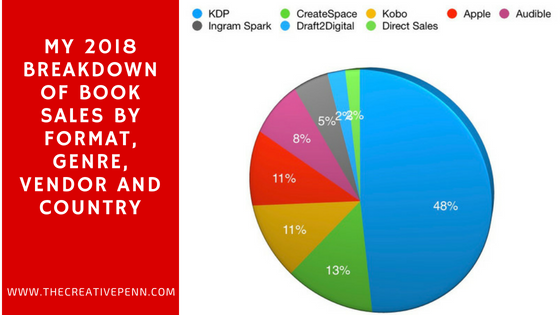 You can read previous years breakdowns on my author timeline here.
You can read previous years breakdowns on my author timeline here.
[Thanks to Russell Philips, Virtual Assistant at Author Help who collated all my figures from all the various platforms.]
These figures are all based on revenue, the money that has actually come into my bank account.
Because I publish through so many sources, I don't actually track book sales numbers very often. Let's be honest – the money is more important anyway!
Total sales and income
Just to be clear, I'm an author-entrepreneur and my income comes from multiple sources – book sales, affiliate sales, course sales, sponsorship, advertising revenue and Patreon, plus speaking fees. It's all documented in How to Make a Living with your Writing, available in ebook, print and audiobook formats.
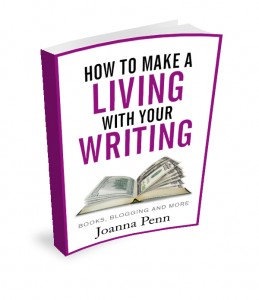 The business as a whole is up 8%, which is not hugely significant growth but still heading in the right direction.
The business as a whole is up 8%, which is not hugely significant growth but still heading in the right direction.
My book sales income has remained about the same, about 3x the UK national average income.
At least it's not dropped and I still make more money than most authors, based on the Guardian report that average earnings for British authors are now just £10,500.
Remember, I have never had a breakout success, and continue to subscribe to the consistent hard-working author model! You don't need to be a household name to make a decent living with your writing.
Of course, I also make less than some authors I know – some indie, some traditionally published. But comparisonitis is dangerous, and we should all be comparing our current selves against where we were last year, and where we want to be next year.
Here's the more detailed breakdown. [Click here for last year's graphs.]
Breakdown by vendor
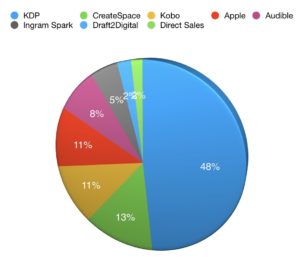 Unsurprisingly, Amazon KDP is the largest chunk of my book sales income at 48% of revenue. Createspace (13%), Kobo and Apple (both 11%) and Audible is now at 8% of revenue – double last year's figure.
Unsurprisingly, Amazon KDP is the largest chunk of my book sales income at 48% of revenue. Createspace (13%), Kobo and Apple (both 11%) and Audible is now at 8% of revenue – double last year's figure.
This does reflect my renewed focus on non-fiction audiobooks which I have found to be my most profitable audio income stream.
But remember, book sales are only one line item on my company income statement.
Amazon companies (KDP, Createspace, Audible) only make up 13% of my total company income. I am super proud of this as way back in 2014 when the Hachette/Amazon dispute was going on, it was clear that companies who relied on Amazon could find things going very badly when the rules changed. Reporting showed that some publishers had 65% or more of their revenue coming from Amazon, and would be in trouble if market situations shifted. At that point, Amazon companies were around 85% of my income and that's when I doubled down on multiple streams of income.
As I have said before, I am an independent creative and I will not depend on one company for my livelihood.
Breakdown by format
Print is up from 10% last year to 21% this year, and audiobook is up from 4% to 8%.
I have focused much more on print this year, with expansion into workbooks and Large Print, as well as doing every edition in my backlist on Ingram Spark, so my income in print is significantly better.
Audiobook income has doubled, based on doing more non-fiction audiobooks and keeping them exclusive on Audible. I find that non-fiction audiobook listeners are less sensitive to price and length, plus they are not so focused on celebrity narrators – plus, I have a podcast where I can advertise to audio listeners.
Click here for links to all my non-fiction audiobooks for Joanna Penn, and here for thrillers by J.F.Penn.
Breakdown of ebook sales by country
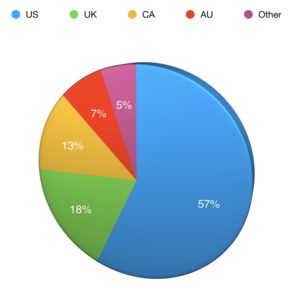 This breakdown is not significantly different from last year, but then I think the global ebook market has probably remained pretty static.
This breakdown is not significantly different from last year, but then I think the global ebook market has probably remained pretty static.
I think we will see more of a shift once streaming mobile internet is more pervasive and online retail becomes more common in big markets like India, Nigeria and the Middle East. Amazon's focus on amazon.in and opening up to Arabic language recently demonstrates that the future growth will be in those markets.
The 5% Other category includes sales in 41 countries, as reported through the Kobo Writing Life portal, which is the only one to include a funky world map!
Breakdown of fiction vs non-fiction
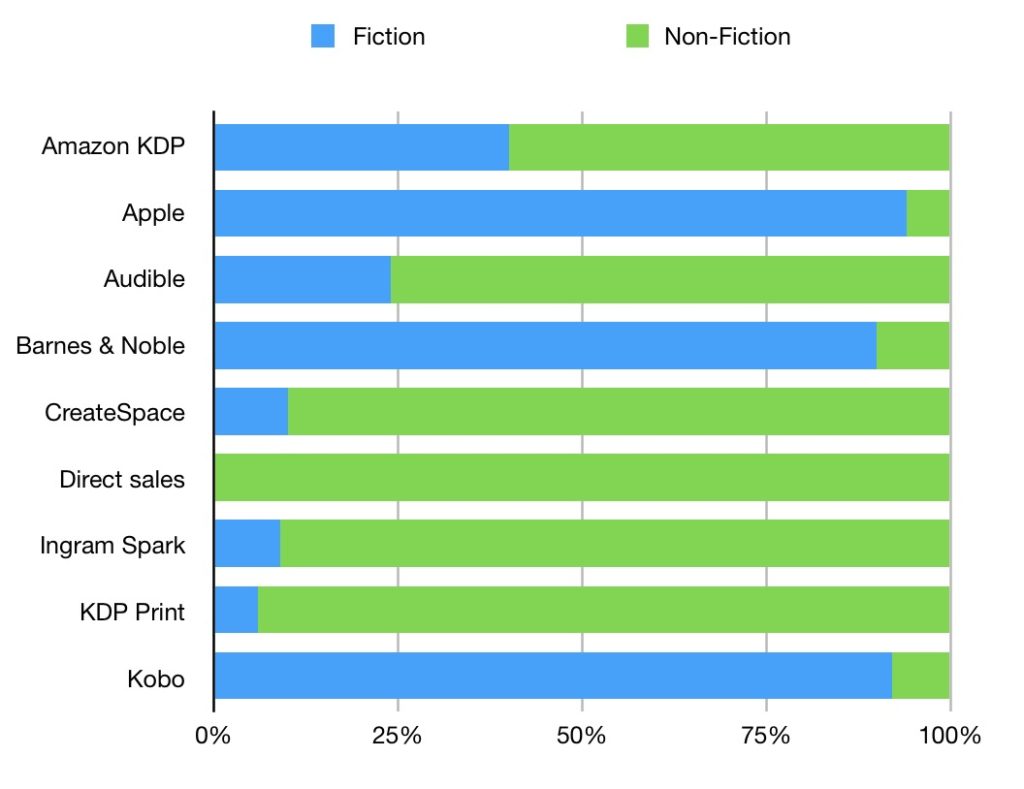 At the time of writing, I have 10 non-fiction titles under Joanna Penn (2 co-written), 15 thrillers under J.F.Penn (2 co-written), and 3 sweet romances under Penny Appleton (co-written with my Mum).
At the time of writing, I have 10 non-fiction titles under Joanna Penn (2 co-written), 15 thrillers under J.F.Penn (2 co-written), and 3 sweet romances under Penny Appleton (co-written with my Mum).
I also have fiction box-sets, short stories and multiple editions of all of these titles.
Fiction and non-fiction sell differently on different stores, as you can see from this graph.
Apple and Kobo are primarily fiction, mainly because one of the most consistent sales methods is a permanently free first in series. Plus, Kobo has a lot more promotions for fiction than it does for non-fiction. Boxsets continue to make up a large chunk of Kobo income, because they are easier to merchandize.
The print sales through Createspace, Ingram Spark and KDP Print are primarily non-fiction, which is not surprising to me, as non-fiction does incredibly well in print. Most of the print books on my own bookshelves are non-fiction. I devour 2-4 novels per week right now on my Kindle, but I only listen to non-fiction audiobooks and I only buy print non-fiction.
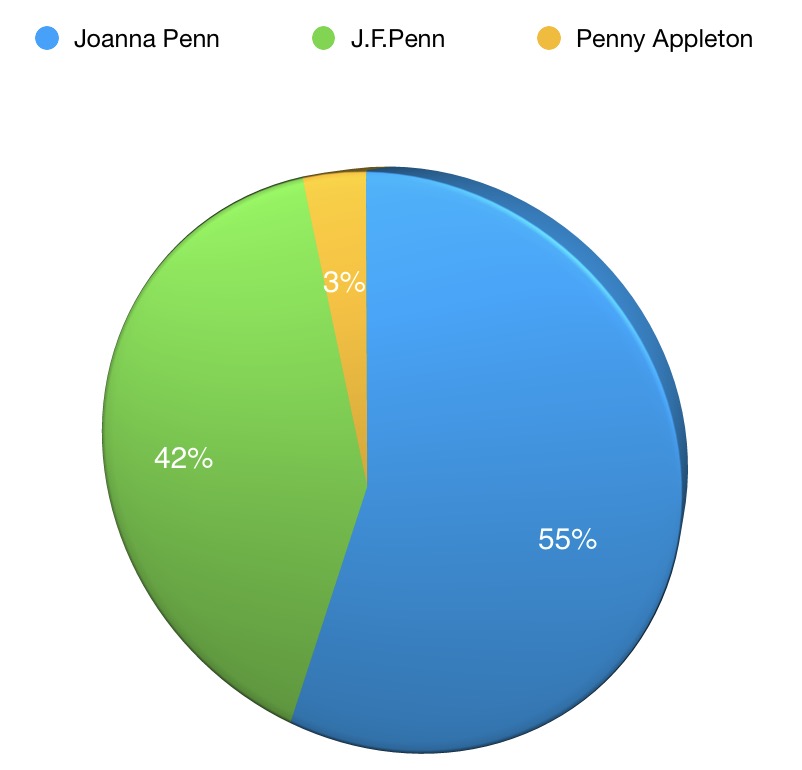 Breakdown by author name
Breakdown by author name
I have cycled between 3 author names in the last year, and written books under each of them.
- Joanna Penn – How to Market a Book Third Edition, The Healthy Writer, How to Write Non-Fiction
- J.F.Penn – Map of Shadows, The Dark Queen short story. I also wrote a screenplay but that is not saleable at this time.
- Penny Appleton – Love, Second Time Around, Love, Home at Last, Love Will Find a Way
The time spent on the Penny books doesn't warrant the revenue received – and hopefully gives an indication of how difficult it is to start a new author name in a new genre without much marketing.
I have significantly more fiction books in total under J.F.Penn than I have non-fiction, but the larger revenue comes from Joanna Penn books. That's because I haven't written much fiction this year, and I have a much easier time with marketing non-fiction. So this split is not unexpected.
My thoughts on the results
I'm slightly disappointed that the total sales figure has remained the same given the number of books I put out last year – but my focus is often split between my multiple streams of income, and I'm not in KU or focused on book marketing every day.
As my friend and mentor, Yaro Starak, said on a recent podcast about website traffic, if you are not constantly feeding your income sources, they will atrophy and die. That's true whether it's web traffic or book sales.
But wait, I hear you cry! Didn't you write How to Market a Book? Why aren't you rocking the book sales and making six figures a month like A.N.Other indie author?
The truth is that I know what I should do if I want to earn more money from book sales:
- Write under one author name – instead of three: J.F.Penn, Joanna Penn, Penny Appleton, which splits my focus.
- Write in one (preferably popular) genre – instead of multiple genres: non-fiction self-help, action adventure thriller, religious conspiracy thriller, crime, dark fantasy, and sweet contemporary romance. Again, this splits my focus.
- Put out books in a series regularly, preferably within the 90-day window, instead of writing one book a year in multiple series. Yes, you guessed it, this splits my focus.
- Cut out some of my other multiple activities – of which there are many, all splitting my focus!
- Be consistent and organized with advertising my books instead of getting to the end of the month and flinging some ads up, or remembering to do ad stacking on launch but not for the rest of the year.

But one of the most important things in a creative career, or in fact as part of life in general, is to Know Thyself – as the ancient Greeks had carved above the temple of Delphi.
I know that I can't just do one thing, my brain doesn't work that way. I can't just write one genre, or one series, or do the same thing for too long. My creative self would go nuts, so some form of focus splitting is inevitable for my character type.
So Creatives, do what I say, don't do what I do! (Unless like me, you are an eclectic mind who can't stop doing all the crazy stuff!)
So, what will I do to increase book sales revenue in the next year?
With all that focus splitting in mind, here's what I intend to do:
(1) Stop writing Penny Appleton
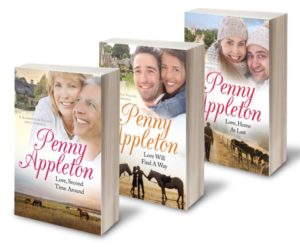 Mum and I have agreed to stop doing Penny Appleton books. It's been a good run but we are not a natural writing partnership and she needs to move forward with her writing career separately from mine.
Mum and I have agreed to stop doing Penny Appleton books. It's been a good run but we are not a natural writing partnership and she needs to move forward with her writing career separately from mine.
I need to get back to writing what I love – which is thriller, crime, dark fantasy, and horror. I'll be doing a podcast with Mum to discuss lessons learned in the next month or so. We're both pleased with the 3 books, but now that episode is complete and we can move on.
(2) Focus on writing J.F.Penn books for the next 18 months
I want to keep serving the writer community (you guys!) but I can do that through my podcast, blog, YouTube channel, and my courses, so no more non-fiction books until 2020. I'll be recording some video lectures on different topics, and I'll be updating the older books, but no more new books for Joanna Penn.
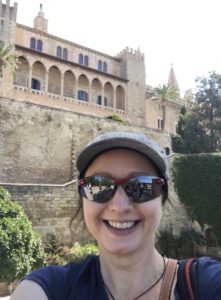
My writing time is for J.F.Penn. I'm currently working on Valley of Dry Bones (ARKANE #10), and probably a novella based in Amsterdam after that. Then the next 2 books in the Mapwalker series. Then I have a standalone horror I want to write, and more in the London Psychic series.
As much as I have been enjoying screenwriting, I just can't focus on it right now. It's a whole new way of writing and I need to focus on my first love, which is fiction. I read for at least an hour every day for pleasure – and it's always books. Never scripts. I'll circle back to scripts at some point, but for now, back to the novels.
If you want to keep up with what I'm doing for fiction, you can follow my journal at www.JFPenn.com/now.
I'll also be focusing more on content marketing for fiction, and yes, there will be some sporadic paid ads for launches.
(3) Make more of what I already have
Update my older non-fiction books and get my backlist into audio and other print formats, like workbooks and Large Print.
Expand formats. I need to get all my books onto Google Play. I intended to do that last year and didn't get round to it. Now PublishDrive has signed a deal with a Chinese ebook distributor, I'll be using them for Play and other vendors – in addition to going direct with Amazon KDP, Kobo Writing Life, Apple Books, and also using Draft2Digital.
License rights to foreign markets. Even as I type this, we are negotiating a deal for South Korean rights. Rights deals add money to the bottom line without taking any more time to write more books. They make more of what we already have. You don't need an agent. You can pitch and negotiate deals yourself. Read these 2 books before you try anything! Closing the Deal on your Terms by Kristine Kathryn Rusch, and How Authors Sell Publishing Rights by Orna Ross and Helen Sedwick.
So that's my round-up. Have you reported on your annual sales revenue and broken it down this way? Please do share in the comments if you have anything, or ask any questions you'd like answered.
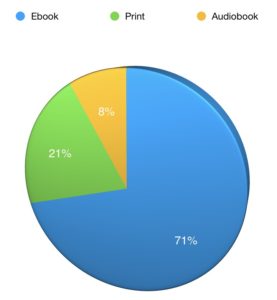
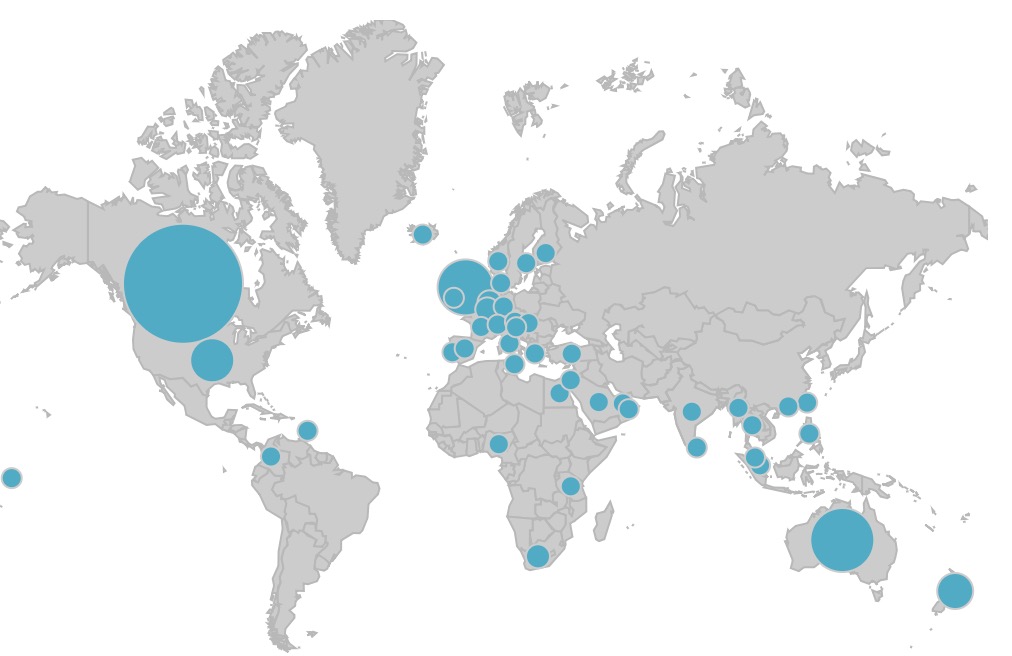



Thanks for giving us this honest and transparent report of what and how you’re doing. I’m learning so much from your blog. Here’s good vibes to you for next year and beyond!
Thanks Hannah 🙂
Is your mun going to release her future books under the Penny Appleton name?
Seems like it would be a shame not to take advantage of the existing three books.
No, she will keep her future books separate. She’s even going to talk about that when she comes on the podcast. Mainly because our joint ‘voice’ is different, and I have been open about my part in Penny Appleton, so any future books without my input need to be separate.
P.S. Thanks for your help:)
That all makes sense. At least she’s got a smart daughter that can stop her making the really daft mistakes that the rest of us made when we started 😉
And you’re welcome 🙂
So glad to see you helping Joanna, Russell. Small world! 🙂
It really is 🙂
Thank you for this excellent post! As always you’ve given me food for thought and inspired me to make more of my backlist. Large print is definitely a way to go, as is audiobooks from my non-fiction titles. (I’ve got a second one coming out in September)
Like you, I know I need to focus on less activity: my mentoring business is growing and although I love passing on what I know, it cuts heavily into my writing time. I’ve decided to look into starting a regular podcast and I’m in talks with another indie author service provider to set up an online course. We work a lot together helping authors, so this seems a good idea. (Although I know it’ll be time-consuming to begin with)
It’s interesting to see that you feel you need to have just the one author name and genre – I’ve long been pondering (as you probably remember) if I should write Nordic Noir (rather than just Nordic Romance) under a different author name.
Your business is growing, however, much due to your creativity and ability to react to market conditions quickly. This is something we indies should treasure.
I’m still very happy with the two names, Helena. I love keeping my fiction and non-fiction separate. I just struggle with more than 2 names 🙂 I definitely think non-fiction audio is a good investment, especially if you do have a podcast for marketing. Have fun!
Congratulations on your success. If one is intelligent, as you clearly are, it is always a difficult choice, try something else or stick at what you are doing. When I was a secondary teacher I used to tell my bottom sets that a route to financial success in life is to find something you love or are good at and work hard at it. Writing appears to obey the same rule. Good luck for next year Jo; you’ll always have our support. 🙂
Thanks Christopher – and yes, the tyranny of choice! I am so grateful for all the opportunities we have these days, it’s a smorgasbord of delight, but not being focused enough means you can’t progress too far in any one field. Time to knuckle down!
Google Play is once again open to ebooks submissions, or so I heard. You should look into it, as of course, going direct allows you a finer grained control (and faster/fater royalties).
The last time I had a go on it direct, it was super painful. The benefit of going through PublishDrive is they have a lot of other ebook distribution as well, including the Chinese site and others. I really can’t cope with too many more distributors!
I tend to agree with not going direct to Google Play. Any interaction I have with Google anything tends to plunge me into a world of pain–apparently I don’t speak Google. Putting my titles on PublishDrive has been on my list for ages.
I’ve been direct on Google Play for stone years now. The current dashboard is terrible, but it’s still light years ahead of the old one. I remember editing metadata by downloading a spreadsheet, editing it, then re-uploading.
I just recently got a Google Play account, and I found it to be easy. It doesn’t have a place to put in keywords. Some authors put those in the description. I haven’t done that. I love Google Play.
Sorry. I had an incomplete thought. (This is what happens when kids are nearby.) Anyway, I was going to say that the only downside is the keyword thing.
Glad it’s working for you, Ruth Ann!
What an open and thoughtful look at your existing business and what you need to streamline. Any type of business needs to do this. You have inspired me to drop some of my ‘nice to have’s’ and refocus on the essentials – in my case writing the next book and marketing all the books.
Re-focusing on the essentials sounds like a great plan! Glad to help 🙂
I’m always surprised you don’t track sales numbers. It takes up way too much of my time (which is probably why you don’t do it) but it really helps me to understand what effect my actions have on my income. Also, it helps me massively if I have a target, which is in sales units rather than in £ since like you most of my income is from outside the UK and I have no control over the exchange rates in play.
I track ebook sales daily to see if I’m on track for my target. Falling sales spur me on to greater marketing efforts! And I’ve learned to see the patterns that emerge on Amazon, far more than on the other platforms.
And on that subject, what I’m REALLY jealous about is your low dependence on Amazon. As much as I try, Amazon is a bigger and bigger percentage of my sales, probably because I’ve become adept at spotting those patterns and know how to work with Amazon to best effect. I don’t like that at all, and next year’s target is going to have to be about reversing that trend.
You hit the nail on the head with why I don’t do it. Because I am wide, it takes way too long to add it all up. I am part of the Kickstarter to get Trackerbox for Mac, so hopefully, that will be up and running before the end of the year. Then I will probably do it by quarter – or maybe I will do it quarterly anyway from now on. I SHOULD do it more regularly – but I don’t mind measuring money more than sales!
On Amazon dependence, it’s a tough one. Clearly there are authors who are doing INCREDIBLY well selling only on Amazon. And as long as they are putting money aside in case it all goes wrong, then fantastic. You have to choose your business model and then double down on that, I suppose.
Joanna, thank you for this incredibly helpful summary of your author business! This level of detail is so helpful for those of us who are in the earlier stages of our author journeys.
I’m also juggling multiple pen names and wondering whether to give one up. Your approach of no new books, but optimizing and expanding what you’ve already written is a terrific idea!
Brilliant work. Thank you again!
Thanks Courtney – and the constant juggling means I am dropping too many balls! I will be doing more books as J.F.Penn 🙂
Joanna, thank you for this overview. I found it very encouraging because although my numbers are minuscule compared to yours, the percentages are very similar.
I’m sorry to see Penny Appleton leave us. I enjoyed all three books but I am pleased to hear that your mother will continue to write under her name or her pen name. How will I know when a new book comes out?
Thanks so much, Susan, and I really appreciate your support of the Penny Appleton books. Mum will have a new name – and the way to be notified will be to ‘Follow’ her Author Page on Amazon. I’ll probably announce it on my podcast as well!
It’s very cheering to know that your book sales are doing so well, and they are very well deserved. There seems to be lots of good news in the indie industry. I was interested to see that most of your sales are to the US. Do you mind if I ask whether you write with the US in mind, ie. American English, and making sure you angle your books in a way you know is preferred over there? I am very impressed at how many books you have planned. How many hours a day do you spend writing? I know you have lots of other work in marketing, podcasts, blog posts, etc. etc., I am intrigued as to how many hours it all takes. Lots I imagine!
Hi Claire, The USA is the biggest digital book market right now – and so the majority of most indie author sales are USA. I write in US English for that reason.
I binge write, so 4+ hours per day in first draft mode, then usually 2 hours – for the pure writing part. But I usually work 8+ hour days 6 days a week, and a few hours on Sunday, so it is more than a full-time job to run this business 🙂 I love it – but it’s not for everyone!
Thanks for that Joanna. You’re right, it’s hard work, but as you say, if it’s enjoyable then it’s not a chore. I’d love to reach the point where I have that many hours to devote to a writing business. I’m working on it!
I’m also juggling three pen names and caught between the cost of split focus and the gain of multiple creative outlets. Not sure yet which one I’m going to focus on solely in the coming months, but something’s got to give.
I love your year summaries. Thanks for being transparent and practical.
Thanks Claire, and I hope you can figure out where to focus for the next year 🙂
Google Play is a lot easier to use than it once was. It’s still as ugly as hell, and you can’t get paid without setting up a limited company, and they charge 50% royalty – which is outragious, but the site now actually works.
I’m making good traction on there.
They mess with your prices too, really annoying. They’re too big to care and this is not their core business, still, it’s another revenue stream.
I’m not a limited company, and I get paid.
Thanks as always for your openness about your income, Joanna. I’m particularly interested in your struggle as a person with multiple interests—that describes me to a T! (Did I ever send you this link to the Too Many Aptitudes web page? http://megasociety.org/noesis/138/aptitude.html ) The agonising about what to prioritise never ends, so I admire your intention to focus purely on the fiction for the next couple of years, a bold move that I’m sure will pay dividends.
As an aside, I was on the outskirts of Bath on Monday, taking a very scenic route back to Brighton from the Cotswolds, but a major traffic jam led to me swerving away elsewhere. otherwise, would have offered you a cream tea!
Finally, really glad to see you’re making use of Russell’s many aptitudes! I’ve known him through our mutual hobby for many years and we even reviewed one of his books (favourably!) in my magazine.
Thanks Henry – and it’s only the book-writing side that will be fiction. My afternoons will still be The Creative Penn through podcast, courses, YouTube etc – so paring down, but still serving the author community!
Thanks for sharing all of this, Joanna. It always amazes me how much you take on every year – good for you!
(And in regards to Korea, if you want any data on advances and royalty rates for comparison as you negotiate your NF, let me know as we’ve sold all our books to that country.)
Good to know about Korea, Angela! And I’m aiming to take LESS on this year 🙂
Thanks for being so honest and open, Joanna. I’m not sure I could do so on such a public platform like this, as you do, but perhaps if other writers could see how people such as you can make a good living from being Indie they would have something to aim for, and some lessons to learn in how to get there.
I do tell people my income, but mainly at Writing Festivals because I just love how trad published authors jaws drop when I let it slip in conversation 🙂
You’re doing great, Joanna! It’s hard to stick to just one name/genre/THING and grind it out. It’s a surer road to $$$, but it can be a road to burnout too. If I didn’t hare off to take on side projects all the time, I’m sure I’d go crazy.
Thanks Lindsay – and I always think about you when I do these round-ups. You manage to keep the balance right – with writing and the dogs and walking and tennis for fitness – and I see you’re travelling more too 🙂 AND a podcast! You’re my hero!
Question, when you say your book sales income is about three times national average wage ( so about 80k if I’ve done my maths right). Is that turn over or profit ? And if it’s turn over what, in broad terms natch, is the profit like ?
Mine incidentally is both halves of jackshit, I’ve done about £45 since March. ( turn over, no profit, still in the red) and got about 50 free downloads on my magnet book. That said I didn’t expect any different because I’ve done no marketing, the business plan was always to get three series books out before I started promoting so 45 quid is actually better than I was expecting.
Hey Pete – it’s never a good idea to put actual figures up IMHO 🙂
But income is income, not profit.
This is a sales breakdown, not a profit breakdown – and I’ll save that for my accountant!
But suffice to say, I am running a solvent business and work with lots of freelancers and have the publishing and advertising costs, so have outgoings. But yes, it is profitable.
I was at your kind of numbers at the beginning, so take heart and carry on!
I hear what you are saying, but it would be super useful for dispelling the myths about what indie authors can or can’t make if someone successful was willing to be open about the profit and loss numbers, even in a generalized way. ( I’ve seen Ron Vitale do this but he’s not yet achieve the breakthrough that people like yourself and Mark , Nick etc have). I’ve also seen Paul Teague do it but again he’s in the middle ground… it would be really handy to see it from one of the big names.
Sales figures are great and its fantastic that you share them at all, but the problem with them in general terms (not yours specifically) is that six figures worth of sales is worthless if it also costs nearly that to make them.
I once knew a photographer who also sold courses on how to succeed in the business etc who loved to trumpet his yearly gross income of 75k… he was much quieter about the fact that his net was less than 15k and his hourly rate was less than minimum wage.
I’m not saying that that is the case for you. I know you are too honest for that kind of deception, but it is the argument that’s thrown back by those that like to argue that Indie publishing doesn’t work
Hi Joanne,
Thank you for all you do. You have literally changed my worldview of writing. I’m also glad your comment section has a spell check or I’d feel really bad.
Is it essential to reformat your manuscript to use on Amazon? I’ve looked over the book by Chris Mcmullin and it seems to be a little crazy. (a lot crazy).
If you have to change your manuscript, I have several novels I’ve tried to sell the traditional way that are ready to go, is there something more organic to the process?
Thanks again, you are wonderful. keith
You can load a Word doc but much better to have a well-formatted manuscript – options here: https://www.thecreativepenn.com/formatting/
I use Vellum which is awesome – here’s my tutorial: https://www.thecreativepenn.com/format-ebook-print-with-vellum/
Just realized I hit e instead of a. I beg forgiveness, Joanna.